Qigong is an Energy Therapy, and helps cancer patients rebalance their energy. Interestingly, it featured significantly in 2007/8 Complementary cancer therapies conferences in Edmonton, Canada and in Seattle, with many papers evidencing its benefits. This article looks at the exercises and benefits. There is also a second article; to read that click here.
Qi or Chi means energy and Gong or King means practice, so Qigong (or Chi Kung as it is sometimes spelled) means energy practice.

Qigong was developed for healing and the optimum maintenance of mind, body and spirit

It encompasses a system of exercise to combat stress, prevent disease, promote fitness and relaxation.
An ancient and for many centuries, secret Chinese practice, Qigong was developed for healing and the optimum maintenance of mind, body and spirit.
How Does It Work?
Postural exercises, focussed breathing and a series of slow, gentle movements help activate your circulation and promote the flow of energy or qi to ailing areas of the body.
Qigong invigorates without straining or exhausting the body, so its ideal for people in recovery from serious illness.
Besides helping you remobilise safely after surgery, qiqong aids concentration and the spontaneous sense of being in the present that adults often lose through everyday stresses never mind a brush with cancer.
"Qigong can really help you stay in the moment" says Angus Clark, a teacher of the White Crane form of Qigong and consultant on the handbook Secrets of Qiqong (Dorling Kindersley). "During exercises I experience lovely moments when I feel really clear and peaceful. This doesnt have to be a grand mystical experience - it can be very simple. But in a crazy modern world where so many of us suffer from a sense of isolation there is something really reassuring about feeling part of a larger whole."
Postural Exercises
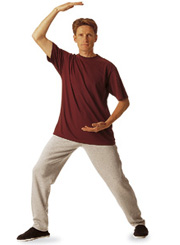
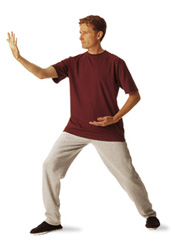
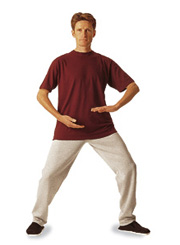
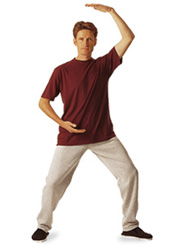
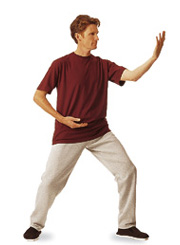
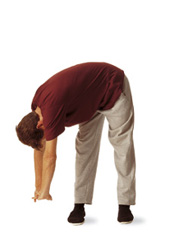
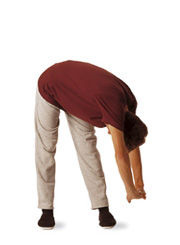
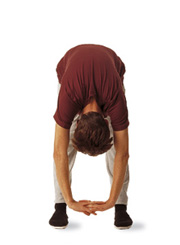
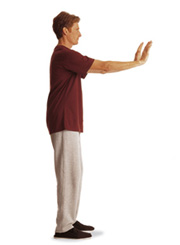
The History of Qigong
This healing art dates back 2,500 years to the Daoists, or ancient Chinese sages, who sought the key to health and longevity. During the first millennium BC, China was broken up into small warring states, but this group of reclusive philosophers gathered in the Wudang mountains to develop the ideas on which qigong is based. The classic text of Daoism is the Tao Te Ching of Lao Tzu, who in the sixth century BC stressed the value of breath training to develop qi and "achieve softness. Qi protects us, warm us, transforms and transports.
Many different lineages of qigong were developed and refined within individual clans who handed them down in strictest secret Some strands of qigong were developed to promote martial strength and skills, but the healing discipline is the absolute antithesis of tightening muscles for attack. Its all about mentally and physically letting go and letting flow.

Qi protects us, warm us, transforms and transports

For centuries, too, Chinese doctors and philosophers have concentrated on using qigong to maintain good health rather than curing bad. Hence their old saying: "You pay a physician for as long as you are well. But should you become ill, you pay him no longer".
Until the 1950s qigong was an exclusively Chinese art, but after the Communist Revo!ution it spread into the west along with acupuncture and tai chi.
The Philosophy
Qigong remains centred on good health. "Working at qigong when you are well is ideal - thats the very time you should take care of yourself But its often only when were ill" says Tricia Teahan, who holds classes for women recovering from breast cancer at The Haven in Fulham, London, "that we really begin to consider our lives and wonder what we can do to make ourselves feel better again."
Though still undersung in the UK, qigong is becoming an increasingly popular feelgood force. It wont appeal to gym fanatics who rate the worth of a workout in sweat poured and cardiovascular count raised. But the eastern take on health is much more simple. "Qigong centres on very accessible exercises" says Tricia, "ways of stilling the mind that you just need to cultivate. So everybody can do them, even if they had surgery just months earlier."

Qigong is becoming an increasingly popular feelgood force

Qigong movements and sequences - such as the warm-up exercise "Blowing in the Wind" - often involve visualisations and improvisations. "Floating Under Water" invites you to move like the fronds of an aquatic plant, while "Ocean Journey" mirrors an iceberg towed and buffeted by currents and waves.
The body benefits of Qigong warm-up alone, say physiologists, include raised core body temperature which speeds nerve impulses and aids the response time of muscles to brain commands.
Qigong and Cancer
Qigong can train your mind to direct energy at parts of the body most in need. Tricia Teahan practises the nei dan discipline of qigong, which encourages not just physicality but a grounding and connection with your inner self. "In modern society" she says "we carry around such a lot of stress and baggage that we are holding tension all the time. The qigong concept is that we look for results beyond the mental clutter of words and thoughts. We concentrate on working through direct experience, noticing our own unique actions and reactions. When working in a class, theres no sense of competition or looking to your neighbour to see how the techniques ought to be done: qigong is mainly about working with yourself, on how you are and how you feel."
Tricia explains that key Daoist concepts are flexibility and adaptability in life, "really allowing things to happen rather than struggling to make them happen or be constantly doing. Its about effortless movement. I dont think the Dao needs any interpretation when telling us that an army without flexibility never wins a battle. A tree unbending is easily broken. Daoism is really about emptying ourselves of tension, of all the thoughts, beliefs and dogmas that overcrowd our heads. Its about not giving ourselves any limitations.
A class at The Haven starts with warm-up exercises for the joints, with top-of-the-neck, shoulder and arm movements, an exercise to relieve congestion in the pelvis.

Key Daoist concepts are flexibility and adaptability in life

Tricia then draws her students attention to their breathing: "Im not teaching people how to breathe. Im asking them to be more aware of their own breathing, of relaxing as they breathe in and out. Is the chest rising? Is the breath right down into the abdomen or is it just a shallow breath? A lot of people find it hard to breathe deep into the lower dan tien as the abdomen is called in qigong -its the centre of our being.
You want to give people the sense of energising this area, this core, and of working up through the spine and with the organs. We almost cultivate this energy helping it to flow and reach out to the periphery. The class finished with a meditation focussing on the breath. We also do qigong meditations with the skin, with the muscles and the bones, just focussing your energy all the way down as you work through the body. As you get more advanced you can begin to work deeply with the bone marrow and the brain."
After serious illness, self-esteem, says Tricia, is often quite low and people may even feel alienated from a body that seems to have let them down. She doesnt evangelise about her exercises: "I dont want to tell people Qigong is going to help them. I want them to find the benefits themselves. Women who have recently had breast surgery may not be able to make all the movements right away. But everything I do has a modified version. If someone cant do whole arm movements they can start with smaller circles. Anyone whos tired can work sitting or even lying down. Its possible to make very tiny physical movements yet maximise results by mentally envisaging them as a big circle encompassing the whole body."

Dont analyse the whys and wherefores, just observe

Throughout each class Tricia encourages her students to bring mind and body to the task. " l might say just notice whether one side of your body is stifler than the other when you turn your head. Dont analyse the whys and wherefores, just observe. Notice how your body is in the present time and from practice just notice if it improves. We also do a cleansing movement, taking the energy up from the earth and letting it wash over you.
Angus Clark believes that major changes can occur as you practise Qigong: "theres a rise in energy levels, a general strengthening. If you are a person who is sometimes really up and sometimes down, that imbalance would start to repair. You are building your life energy and that is bound to have a positive effect on your immune system and your general health."
Certainly Qigong classes will help cancer sufferers reclaim confidence and responsibility for their own health: "After treatment" says Tricia "people may be left wondering: Well what do I do now? Do I keep taking medication? Can I do something for myself? They find, through qigong, that they can. Ive known women come in saying they feel so down after chemo that they really didnt like leaving home. They had to psych themselves up to come, but after our final, relaxing meditation they leave class saying I feel great. Glad I came!" After a spell in the hands of doctors who know best, Qigong can give a great lift, says Tricia,
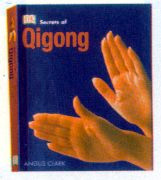
"Because it invites you not to be a patient following instructions but to express your own self through movement and postures. Reconnecting with that self you realise that you can contribute a lot to your own wellbeing and your journey from cancer to the best possible health. Quigong helps put us back in touch with what is important in life."
Tricia Teahan reluctantly accompanied a friend to an Aikido class - and became hooked on energy work. She became a black belt and went on to study shiatu. craniosacral therapy Chinese medicine and Qigong. She teaches at The Haven and trains at the College of Qigong. North London. Contact her at 07904 238 745 or: [email protected].
Angus Clark took a degree in environmental science followed by a PGCE teaching qualification. Based in Devon he now teaches qigong across the country and abroad, also running retreats in Europe. You can contact him at [email protected].